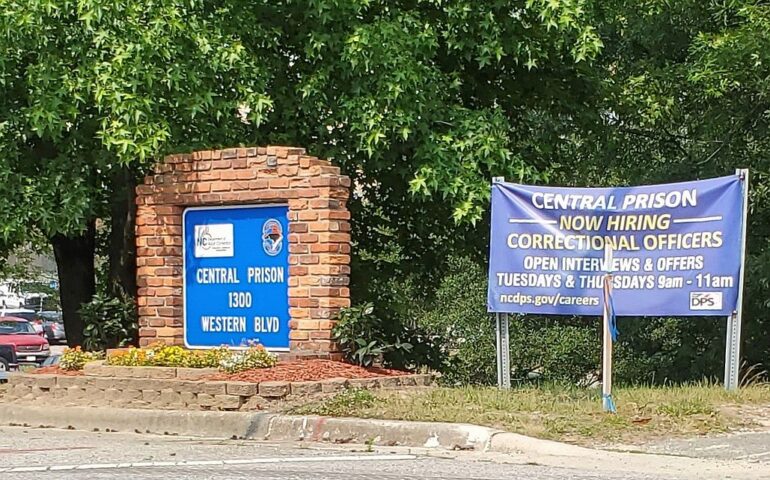
Outside Raleigh’s Central Prison a banner offers open interviews to would-be job seekers.The vacancy rate of North Carolina’s corrections officers is now 40%. (Photo: Clayton Henkel)
When four employees at Pasquotank Correctional Center were killed in 2017, almost a third of corrections officers’ positions were vacant.
Now, the vacancy rate of North Carolina’s corrections officers is 40%, leaving the state’s prisons vulnerable once again to the kind of tragic violence from six years ago, a speaker said at a conference in Raleigh on Monday.
“We have got to fix this vacancy crisis. It puts everybody at so much risk all day, every day,” said Ardis Watkins, the executive director of the State Employees Association of North Carolina. “It’s not ‘if’ something is going to happen. It’s ‘when.’”
Watkins was among an array of presenters and panelists at a forum focused on reforming North Carolina’s prison system. NC-CURE organized the symposium, titled “Restoration Matters: Proven Solutions for Prison Reform,” bringing together state and national experts to discuss the challenges facing prison employees and the people who live in our state’s 54 correctional facilities.
“We’re gathered because restoration does matter, and that is a major responsibility for us in the Department of Adult Correction,” said Todd Ishee, the secretary of that state agency.
Ishee said the state’s ongoing shortage of correction officers is tied to its ability to care for people incarcerated in its prisons, as those vacancies can affect what rehabilitative programs and services are offered in correctional settings. But he said the prison system was working to fix its staffing crisis.
“We’ve got a new human resource team. We’ve hired new talent acquisition experts, and we’re working hard to dig us out of that our staffing challenges that have plagued us for some time,” said Ishee.
Two other recent developments could also help. Legislators approved a step pay plan a few years ago that allows for pay raises based on tenure and job performance. And the department has publicly said that putting air conditioning in all the state’s prisons will help with the recruitment and retention of prospective employees.
Several speakers talked about the important role correction officers play in prison reform, and said such staff should be considered respected members of law enforcement — and, accordingly, paid and given the same death benefits.
“They need to be recognized with what can take care of their family should something happen in this incredibly dangerous and important job they agreed to do,” said Watkins.
Educational opportunities and solitary confinement
Ishee spent a lot of his presentation talking about “Hope University,” a diverse catalog of programming launched last year on the tablets given to imprisoned people. Ishee said there was a broad range of courses that were offered on the software, from French lessons to anger management, parenting classes to mathematics courses.
Department of Adult Correction Secretary Todd Ishee talks about the role tablets play in making prisons safer at a conference on conditions of confinement hosted by NC-CURE. (Photo: Kelan Lyons)
Ishee said that Hope University helps the prison system to bridge the gap between the needs of the incarcerated population and the resources that prisons are able to provide. They tried, he said, to tailor content based on needs, like drug and alcohol recovery programs, since 63% of the 32,000 people in prison suffer from drug or alcohol addiction.
“We’ve tried to create on here a very, very diverse menu of self improvement opportunities for men and women, with the hope that everybody can find something that they’re interested in, something that motivates them, something that they that they relate to,” Ishee said.
Even those in restrictive housing — also known as solitary confinement — can participate in Hope University, Ishee said, offering them a way to spend their time in isolation productively.
“We’re working toward the day where program completion can also shorten that amount of time in restrictive housing, said Ishee.
Multiple speakers talked about the department’s efforts to reform its solitary confinement policies. Brande Harris, the chief deputy secretary of the Department of Adult Correction, said 2,500 people are currently in restrictive housing, 500 of whom have been there there for the “long term,” meaning they’ve been in solitary for longer than 30 days.
Harris said that over the past year about 2,400 people with serious mental illnesses were diverted from solitary confinement to a “therapeutic diversion unit.” An additional roughly 1,000 people also went through another diversionary program, an effort to keep them out of solitary confinement.
“The biggest thing that we are working on is making sure that we reserve restrictive housing for people who really need to be in restrictive housing, and not those ones that we’re mad at,” Harris said. “Because two reasons people go to restrictive housing: we’re mad at them, or we’re scared of them.”
Jobs and mental health
Others spoke of the importance of education so that those behind bars learn a skill during their incarceration and can get a job when they are released.
“Our job in corrections is to correct human behavior,” said Burl Cain, the commissioner of the Mississippi Department of Corrections.
Cain’s presentation echoed Ishee’s in that both prison leaders underscored the importance of job training as a way of making sure the incarcerated don’t wind up back in prison after they’re sent home.
Job training is one thing, but finding an employer willing to hire someone with a criminal record — or a landlord willing to rent to them — is another.
Cain’s son went to prison in 2019. Cain said he had trouble finding work with a felony on his record, which makes it especially important for prisons to teach skills and trades like carpentry, gardening and road maintenance so incarcerated people are in as strong a position as possible to get work once they’re released.
“The success comes when the inmate gets the job,” Cain said
Ishee singled out construction and food service as two industries particularly willing to hire people with criminal records, willing to overlook a person’s past. Prospective employers in food service, Ishee said, tend to just ask “Can you cook? Can you serve? Is the food good?”
Ishee said it was similar in construction. “They care about, ‘Can you lay brick? Can you operate a bulldozer?’”
Mental health was another recurring topic among speakers. Addiction and mental illness are common struggles for people in state prisons. State legislators appropriated an infusion of funds in mental health services in the budget passed last month. Sen. Bobby Hanig (R-Bertie) said that money will be essential in keeping people out of prison who instead need help, not punishment.
“We’re not catching them before they get to prison,” Hanig said. “That’s the biggest way we’re going to affect change in our prisons, I believe.”
A plea
Many of the speakers and panelists worked for prison systems in North Carolina and elsewhere. But a few either spent time behind bars or loved someone who had.
Anthony Willis, the program director at NC-CURE who spent more than two decades in prison before Gov. Roy Cooper commuted his sentence last year, said it is important to treat the people in our state’s prisons with respect and humanity. Part of that, he said, is the language we use to refer to imprisoned people.
“If you look at a person and say, ‘You’re an inmate,’ or ‘you’re an offender,’ that’s how you’re going to treat them. But if you look at him as a resident… you’re going to treat them that way because you’re perceiving them differently,” Willis said. “I think respecting humanity is knowing that that person is someone’s father, is someone’s brother, someone’s son or someone’s mother, sister or brother. And when you address them like that, you’re looking at them like, ‘You have a family out there.’”
Recognizing the power in the room, John West asked officials to take action to both help his incarcerated son and all other parents whose children are imprisoned. West rattled off a long list of issues his son has dealt with while he has been locked up: poor healthcare, harassment by prison staff, being underfed, not having access to air conditioning or 12-step drug and alcohol recovery programs.
“Our prisons seem to show a disregard for the totality of the care that they’re required to provide,” West said. “You are the people who can make the changes. So, I would ask that you please leave here striving to make change.”
The post Solitary confinement, staffing vacancies, job training focus of prison reform conference appeared first on NC Newsline.
This content was originally published here.




